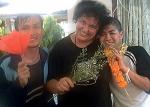Deep Into Mao & China
It’s cold and snowy outside and right now I am deep into the recently published biography of Mao Tse Tung by Jung Chang who also some years ago wrote the respected three-generation epic “Wild Swans.” Jung, born in China, was a Red Guard for a time during the Cultural Revolution and witnessed first-hand the devastation wrought by Mao. She soon after fled to Britain where she was educated. She and her British husband spent 12 years researching the Russian archives and interviewing many of the principal actors of the Cultural Revolution who are still alive.
The book answers my question about why most mainland Chinese still revere Mao after all the devastation he wrought. Apparently, it is because in the absence of a free press he manufactured his persona and made up the whole myth about the Long March (which he fed to the American journalist Edgar Snow who disseminated Mao’s lies in his book “Red Star Over China”) that most people in China still believe in today!
Mao began with no official party status and conscripted local “bandits” that he called an “army.” Then he basically stole a small army from a military commander through blackmail, manipulation and by taking advantage of a technologically ineffective communication system between Shanghai and the rest of China and Moscow where Stalin was pulling the strings. It was by creating an army and by that he was then able to gain credibility and ascend to party leadership. All the while he was carried over snow-covered mountains on a litter by mostly barefoot carriers so he could comfortably read his books.
Meanwhile, Stalin’s top agenda was China’s defeat of the Japanese. Mao’s modus operandi was to lead Stalin into thinking he was following the Soviet line but all the while outmaneuvering Chiang Kai Khek and the Nationalist Army and all other Red factions who were competing for power…no small feat! Moscow bought into Mao’s deception and protected Mao.
Chiang Kai Khek’s nationalist forces had been “chasing” Mao from the south (his wife raised millions of dollars in the U.S. for this war) but let Mao and his “army” go because Stalin was holding Chiang’s son hostage in Moscow. Ironically, for Chiang, the Reds took over China and it took Chiang 11 years to get his son back. As we know, Chiang eventually fled to Taiwan.
Another eye-opening book is the biography of Mao written by his personal physician of 25 years. After Mao died, his physician moved to Chicago near his two sons who had been university educated there. The biography was published just before his death around 1995.
When I was in Bangkok this summer, I gave the biography to a young Chinese woman in her early 20’s who was “visiting her boyfriend.” “He is very fat,” she said laughing, “but he is a very rich Texan!” She was by herself sitting next to me at a sushi bar. Her English was perfect and she was reading a Bangkok travel book in English! Since it is very unusual for mainland Chinese to get out of China alone, I suspect she was there to observe and report back. “Is it true, she asked, “that blacks have group sex?” Astounded, I answered that some may, but people are individuals and you can never say “all” people of an ethnic or racial group do anything! She looked puzzled. We talked for several hours the next morning in a busy coffee shop. I told her I thought Mao was worse than Hitler and she flew off the handle. “My mother (who is a university professor) loves Mao,” she yelled. She also embarrassed me to death in front of the Thais that were present: “I hate Buddah!” she yelled when I asked about Buddhism in China.
Meeting her reminded me of a young mainland Chinese “spy” in Australia who went public about a mainland Chinese spy network that apparently reports on overseas Chinese and asked for asylum when he realized that he had been duped by the Party leadership. Australia, trying to get along with China hesitated but finally gave him temporary asylum (the US refused). He said that if he returned to China he would probably be killed or at least jailed and tortured, a claim that China refuted.
It would have a profound consequence if these books became available to the mainland Chinese. Even better, the Chang book would make an incredible epic movie…and with all the pirated movies in China…it would spread like wildfire among the youth.
Tags: China, New York City, Reading, Reflections, World Watching And Politics

